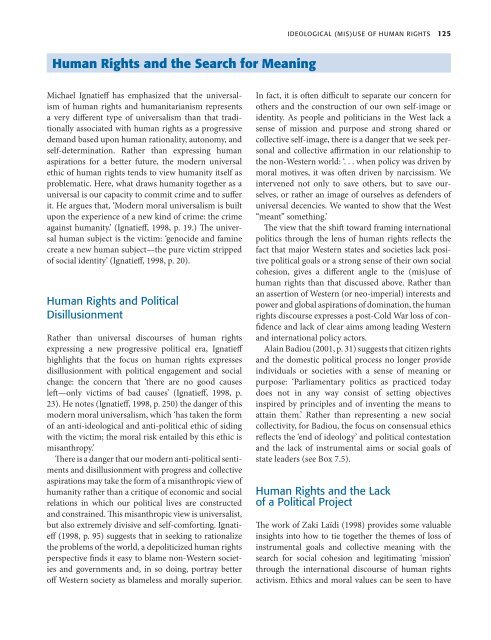Ideological (Mis)Use of Human Rights - David Chandler
Ideological (Mis)Use of Human Rights - David Chandler
Ideological (Mis)Use of Human Rights - David Chandler
Create successful ePaper yourself
Turn your PDF publications into a flip-book with our unique Google optimized e-Paper software.
<strong>Human</strong> <strong>Rights</strong> and the Search for Meaning<br />
Michael Ignatieff has emphasized that the universalism<br />
<strong>of</strong> human rights and humanitarianism represents<br />
a very diff erent type <strong>of</strong> universalism than that traditionally<br />
associated with human rights as a progressive<br />
demand based upon human rationality, autonomy, and<br />
self-determination. Rather than expressing human<br />
aspirations for a better future, the modern universal<br />
ethic <strong>of</strong> human rights tends to view humanity itself as<br />
problematic. Here, what draws humanity together as a<br />
universal is our capacity to commit crime and to suff er<br />
it. He argues that, ‘Modern moral universalism is built<br />
upon the experience <strong>of</strong> a new kind <strong>of</strong> crime: the crime<br />
against humanity.’ (Ignatieff , 1998, p. 19.) Th e universal<br />
human subject is the victim: ‘genocide and famine<br />
create a new human subject—the pure victim stripped<br />
<strong>of</strong> social identity’ (Ignatieff , 1998, p. 20).<br />
<strong>Human</strong> <strong>Rights</strong> and Political<br />
Disillusionment<br />
Rather than universal discourses <strong>of</strong> human rights<br />
expressing a new progressive political era, Ignatieff<br />
highlights that the focus on human rights expresses<br />
disillusionment with political engagement and social<br />
change: the concern that ‘there are no good causes<br />
left —only victims <strong>of</strong> bad causes’ (Ignatieff , 1998, p.<br />
23). He notes (Ignatieff , 1998, p. 250) the danger <strong>of</strong> this<br />
modern moral universalism, which ‘has taken the form<br />
<strong>of</strong> an anti-ideological and anti-political ethic <strong>of</strong> siding<br />
with the victim; the moral risk entailed by this ethic is<br />
misanthropy.’<br />
Th ere is a danger that our modern anti-political sentiments<br />
and disillusionment with progress and collective<br />
aspirations may take the form <strong>of</strong> a misanthropic view <strong>of</strong><br />
humanity rather than a critique <strong>of</strong> economic and social<br />
relations in which our political lives are constructed<br />
and constrained. Th is misanthropic view is universalist,<br />
but also extremely divisive and self-comforting. Ignatieff<br />
(1998, p. 95) suggests that in seeking to rationalize<br />
the problems <strong>of</strong> the world, a depoliticized human rights<br />
perspective fi nds it easy to blame non-Western societies<br />
and governments and, in so doing, portray better<br />
<strong>of</strong>f Western society as blameless and morally superior.<br />
IDEOLOGICAL (MIS)USE OF HUMAN RIGHTS 125<br />
In fact, it is <strong>of</strong>t en diffi cult to separate our concern for<br />
others and the construction <strong>of</strong> our own self-image or<br />
identity. As people and politicians in the West lack a<br />
sense <strong>of</strong> mission and purpose and strong shared or<br />
collective self-image, there is a danger that we seek personal<br />
and collective affi rmation in our relationship to<br />
the non-Western world: ‘. . . when policy was driven by<br />
moral motives, it was <strong>of</strong>t en driven by narcissism. We<br />
intervened not only to save others, but to save ourselves,<br />
or rather an image <strong>of</strong> ourselves as defenders <strong>of</strong><br />
universal decencies. We wanted to show that the West<br />
“meant” something.’<br />
Th e view that the shift toward framing international<br />
politics through the lens <strong>of</strong> human rights refl ects the<br />
fact that major Western states and societies lack positive<br />
political goals or a strong sense <strong>of</strong> their own social<br />
cohesion, gives a diff erent angle to the (mis)use <strong>of</strong><br />
human rights than that discussed above. Rather than<br />
an assertion <strong>of</strong> Western (or neo-imperial) interests and<br />
power and global aspirations <strong>of</strong> domination, the human<br />
rights discourse expresses a post-Cold War loss <strong>of</strong> confi<br />
dence and lack <strong>of</strong> clear aims among leading Western<br />
and international policy actors.<br />
Alain Badiou (2001, p. 31) suggests that citizen rights<br />
and the domestic political process no longer provide<br />
individuals or societies with a sense <strong>of</strong> meaning or<br />
purpose: ‘Parliamentary politics as practiced today<br />
does not in any way consist <strong>of</strong> setting objectives<br />
inspired by principles and <strong>of</strong> inventing the means to<br />
attain them.’ Rather than representing a new social<br />
collectivity, for Badiou, the focus on consensual ethics<br />
refl ects the ‘end <strong>of</strong> ideology’ and political contestation<br />
and the lack <strong>of</strong> instrumental aims or social goals <strong>of</strong><br />
state leaders (see Box 7.5).<br />
<strong>Human</strong> <strong>Rights</strong> and the Lack<br />
<strong>of</strong> a Political Project<br />
Th e work <strong>of</strong> Zaki Laïdi (1998) provides some valuable<br />
insights into how to tie together the themes <strong>of</strong> loss <strong>of</strong><br />
instrumental goals and collective meaning with the<br />
search for social cohesion and legitimating ‘mission’<br />
through the international discourse <strong>of</strong> human rights<br />
activism. Ethics and moral values can be seen to have<br />
08-goodhart-chap07.indd 125 12/9/08 3:06:00 PM
















